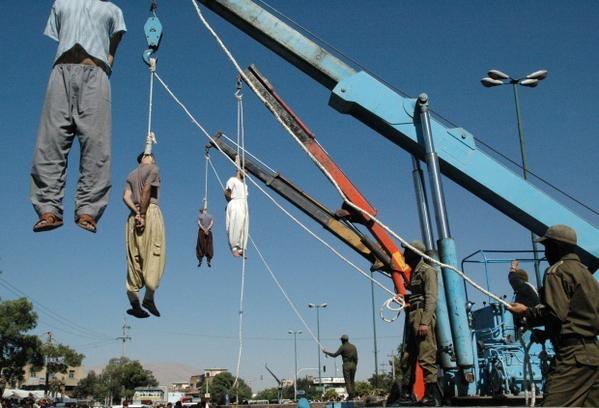
Pakistan worst country in religious freedom: US body
Times Of India/ Oct 22, 2015/
WASHINGTON: Asserting that Pakistan is the worst country in terms of religious freedom, a Congressional- established commission on international religious freedom has asked the Obama Administration to designate Pakistan as ‘country of particular concern’ citing “egregious” violations.The just-released IRF (International Religious Freedom) Report leaves no doubt that the egregious nature of the violations in Pakistan warrant a CPC designation,” Robert George, Chairman of the US Commission for International Religious Freedom (USCIRF), said.
With Pakistani Prime Minister Nawaz Sharif in town for a meeting with US President Barack Obama, George urged the State Department to further expand its CPC list to reflect the severe violations occurring in seven other countries, such as Pakistan, which “USCIRF has called the worst situation in the world for religious freedom for countries” not currently designated by the US government as CPCs.
CPC designation is given to countries or those governments that “engage in or tolerate” systematic, ongoing, and egregious violations of religious freedom.
The International Religious Freedom Act of 1998 (IRFA) requires the US annually to designate as “countries of particular concern” or CPCs, and to take action to encourage improvements in each CPC country.
“Now that the IRF Report has been released, the next step is for the State Department to promptly designate the worst violators as CPCs and to leverage those designations to press for much-needed reforms in those countries,” George said.
In its recent report on IRF, the State Department has said that there is widespread violation of human rights of religious minorities in the country, in particular the Hindus and Christians.. In July 2014, the State Department designated nine countries as CPCs: Burma, China, Eritrea, Iran, North Korea, Saudi Arabia, Sudan, Turkmenistan, and Uzbekistan.
State Department’s 2014 IRF report said Pakistan “government’s general failure to investigate, arrest, or prosecute those responsible for religious freedom abuses promoted an environment of impunity that fostered intolerance and acts of violence, according to domestic and international human rights organisations.”
USCIRF’s 2015 annual report, released in April, recommended that these countries be re-designated as CPCs, and also called for eight additional designations: Central African Republic, Egypt, Iraq, Nigeria, Pakistan, Syria, Tajikistan, and Vietnam.
http://timesofindia.indiatimes.com/world/pakistan/Pakistan-worst-country-in-religious-freedom-US-body/articleshow/49495334.cms?utm_source=facebook.com&utm_medium=referral&utm_campaign=TOI
Iran’s corruption and human rights overlooked
Dr. Majid Rafizadeh/Al Arabiya/October 23/15/
While Iran’s nuclear deal continues to hold the spotlight, two other critical issues demand much more attention than they are receiving. Despite President Hassan Rowhani’s pledges to the contrary, corruption and human rights continue to pose a huge challenge. According to Transparency International, Iran ranks 136 out of 175 countries. The scale of corruption has not changed significantly when comparing Rowhani’s presidency with that of his predecessor Mahmoud Ahmadinejad. A considerable part of the economy and financial systems are owned and controlled by Iran’s Revolutionary Guard Corps (IRGC) and the office of Supreme Leader Ayatollah Ali Khamenei. Since they enjoy the final say in decision-making, Rowhani and his cabinet do not have the power to tackle corruption. Corruption in Iran is ingrained in the political and financial institutions that are the country’s backbone. However, often figures across the political spectrum, including members of the president’s office, engage in corruption for their political and financial benefit. Corruption in Iran is ingrained in the political and financial institutions that are the country’s backbone.Embezzlement and money-laundering within the banking system are prime examples of corruption. In addition, corruption takes place by granting loans, financial benefits and fellowships to relatives of senior officials or those who show their loyalty.
Facade
From time to time, the judiciary might bring a political or business figure to court on charges of corruption. Most recently, billionaire Babak Zanjani has been put on trial, accused of embezzling $2.7 billion from the government-owned petroleum company. The rare occasions when cases are brought to court are not part of a concerted effort to fight corruption. Instead, they appear to be a facade put on to alleviate people’s frustration over the economic difficulties they face, which are exacerbated by corruption. Normally such cases are closed, or the sentences are kept secret after months of trial with no legal explanation. These cases can also be due to political disagreement between factions of the system and the defendant, thereby used as a tool to warn or punish. If the government really wanted to fight corruption, the first step would be to properly enforce article 142 of the constitution, which states: “The assets of the Leader, the President, the deputies to the President, and ministers, as well as those of their spouses and offspring, are to be examined before and after their term of office by the head of the judicial power, in order to ensure they have not increased in a fashion contrary to law.”The government claims to be working to improve Iran’s human rights records, but many have observed that Rowhani’s promises have not even begun to be fulfilled.
Human rights
The government claims to be working to improve Iran’s human rights records, but many have observed that Rowhani’s promises have not even begun to be fulfilled. His office appears to have chosen not to challenge the three major institutions that set the boundaries for human rights, civil liberties and social justice: the IRGC, Iran’s intelligence (Etela’at) and the judiciary. The judiciary recently executed a juvenile convicted for the death of her husband. According to a recent release by the U.N. special rapporteur on human rights in Iran, Ahmed Shaheed: “These executions are disturbing examples of surging execution rates and questionable fair trial standards.” Iran “must comply with its international law obligations and put an end to the execution of juvenile offenders once and for all.”




















